- Home
- Chris Wraight
The Lords of Silence Page 7
The Lords of Silence Read online
Page 7
He passes under the high portcullis, and those bestials blessed with elongated necks bow to him. He processes across the inner courtyard, where his steward, Loam, waits dutifully. Loam is a bestial, with a long equine face and buck teeth. His brown hide is wrinkled almost into oblivion, and glistens from perspiration.
‘Welcome, siegemaster,’ Loam says.
The steward always uses the proper titles. Unlike most bestials, he can talk, although the sounds are crude and he will never be eloquent.
‘How stands the citadel?’ asks Vorx, looking up at the inner walls. They are streaked with moisture, dripping slowly. Flayed corpses bump and swing from one high tower, picked at by carrion crows. From somewhere far down below, he can hear the bubble of boil-vats and smell the cooking from the refectories.
‘Rots,’ says Loam. ‘Topples. Come home more.’
Vorx smiles and keeps walking. ‘I wish I could,’ he says, reaching the great doors to his private apartments.
Once within, he climbs the interior stairs, treading paths that he built himself. Every worn stone is familiar, every smell is comforting. Once he would have scorned such notions, having been made immune to all calls of family or community. Now he values these things. He tends to his herds and his slaves, seeing what can be made of them and taking pleasure in their successes.
After a long climb, he reaches his sanctuary. He takes an iron key from the ring at his belt and unlocks the door. When he pushes it open, a rich swell of old smells tumbles out, ones he has not enjoyed for a long time.
He enters a grand chamber perched high at the pinnacle of the tallest tower. Bookcases line the walls, each stuffed with tome upon tome. Most are leather-backed, some bound in human hide, some in stranger coverings. They are mostly ancient, and their age seeps from them like a stink. They are all slowly mouldering away, flaking into nothingness, drooping from the extreme humidity. Worms burrow into them, gnawing trails through thick parchment. Ivory-eyed rats scuttle from stand to stand, hoarding scraps in their pink claws.
The floor is knee-deep in discarded vellum. Quills scratch across writing desks, propelled by invisible hands, inscribing endless lists. Some are chronicles of years, others are typologies of phages and contagions, others are the names of allies and enemies.
Vorx glances at one, the vellum rustling as the quill wobbles across its surface.
Tophar. Mandravaxon. Járnhamar.
None of those words mean anything to him. They may do in the future, or they may not – it does not pay to listen too closely to the outputs of bound instrumental daemons.
He pushes his way towards a pulpit at the far end of the chamber. A single book lies open on its inclined surface, untroubled by the attentions of vermin. Its hide is as white as bone, and its pages as thick as a finger. It is impossibly huge, that book – if looked at from certain angles it seems to go on forever, sinking deep into the library’s mouldy floor, although from most aspects it is no thicker than the rest of them.
He reaches for a metal quill standing in a dusty sleeve and dips it into a well of viscous ink. He holds it over the blank parchment and collects himself.
Then he begins to write. Slowly, carefully, he traces out tiny letters in immaculate Standard Gothic, of a grammar and idiom commensurate with the early Crusade. The first thing he writes is a name – Brother-Sergeant Caias Meldonia, Squad Taxis, Fourth Company, the Emperor’s Blades. He pauses, remembering the face. Location: Attamar, outer reach spinward, system marker 45-56-3. A faint smile crinkles across his sore-clustered lips. The action had been prosecuted well. We were on the outward march from Kletan. He fills in more details, always in the same manner, not lapsing into Barbaran or Mourtaig, the debased vernacular of the Plague Planet, or even current-era Gothic. This record was started at the very commencement of his career in the Death Guard and has been continued in the same vein ever since.
When he finishes the entry, he carefully adds the date approximation according to both the Terran system and Chronolattice, a scheme of his own devising that maps events to a more fluid set of points underpinned by warp dynamics. It is more accurate, at least from a number of important points of view, although it has peculiarities of its own – whereas the Imperial system becomes more inaccurate the further one is from Terra and the further in time one is from the nominal baseline event, Chronolattice works forward to the end of the universe, a constant Vorx names T, for thanatos, and becomes more reliable the closer the apocalypse comes.
He takes time to cross-reference the entry with previous ones. He adds the relevant numbers to several interlinked grids, drawing the numerals with exactitude. Once done, he tallies certain esoteric relationships and determines if significant patterns have emerged, then logs them in a third set of ledgers.
Then he repeats the process with Ammunition Loader Silv Klood, resident of Attamar orbital station IV. Less is known about that death, for the stature of the victim was minuscule, but he records all that he has been able to determine, for completeness is a virtue.
He has many hours of work ahead. The raiding season has been long, and he has much blood on his hands from it. He labours methodically, giving each entry just as much care as the first ones. The first biographies were written ten thousand years ago. This chronicle, this record of deaths served at his hand, stretches back to the dawn of the Imperial Age. For all Vorx knows, it may be the most complete history of any kind still intact. Inquisitors would sacrifice entire systems to retrieve it, if they only knew of its existence. More than one petty daemon has been spun into instantiation purely as a result of symmetries picked out on the pages. Others of the Neverborn have come to Hope’s Revenant and tried to consume the book, believing its contents might elevate them within their crowded and jostling pantheon, but the library is carefully guarded with ether traps and honey pits, and Vorx has designed many subtler defences to confound them.
The book has no title. Or, to be more precise, the book’s title is also its contents. The final entry will be his own. Such psychic accumulation of killing generates a final artefact – when Vorx dies, the last page will complete itself, capping the immense and winding account of a soul’s extension beyond all mortal tolerance. On that day, the tome will close, turned as if by unseen hands. The symbols will arrange and sift, the numbers will slot into new positions, and its fusion of occult symbology will reach apotheosis. It will be the final legacy of uncountable lives, stored and cross-referenced, counted and totalled, a product of magnificent uselessness.
This is Vorx’s great act of spite towards impermanence. He is smiling as he writes it, and the passage of time slows, dilates, warms up.
He never knows how long it has taken, once he stops. When he looks up again, a day might have passed, or a month, or many years. Such is the nature of the labour, and of the world on which it is performed.
On this occasion, when the quill is placed back in the sleeve and the last of the ink dries on the page, he turns to see a figure in his library. Even after so long on this strange planet, with its comings and goings of gods and daemons, its creaks and groans and its bending of the normal laws, he is taken aback. The place ought to have been secure, and he briefly wonders if his life is in danger.
Then he sees who it is and relaxes. The visitor is far more massive than he – a true giant of twisted ceramite and overspilling flesh. He even knows his name, for there are not many of this breed.
‘You didn’t knock, Slaunn,’ Vorx says.
The Deathshroud Terminator does not smile, at least not obviously. His face is entirely hidden behind a landslip of helm and cowl and bursting flesh. His armour is a near-black green, like pond slime, and his ragged scraps of cloak and chasuble are a dirty grey. He breathes like an animal breathes, and his enormous slumped chest heaves with every intake. The god has been generous to him, Gifting him innumerable alterations, blights and contusions. His long manreaper scythe is warped and curving, mo
re like a coil of rope than a length of adamantium, but it is all the deadlier for that.
Slaunn has been there from the start too. He has seen the cold valleys of Barbarus and huddled in that world’s freezing nights. He knows, just as Vorx does, how much better things have got.
‘He’s ready,’ Slaunn hisses, a dry whisper through old vocal cords.
Vorx prepares himself. ‘So soon.’
‘You have been here eight weeks,’ says Slaunn.
That takes Vorx aback. ‘Really?’
‘This is becoming eccentric now, Vorx. Do not rely on his favour forever. You could have done more, were it not for…’
Slaunn does not need to finish that. Vorx can do it for him.
Were it not for the obsessions. The numbers. The recording, the completion of pointless tasks.
‘Well,’ says Vorx. ‘I am ready now.’
‘He’ll be extravagantly pleased by that,’ says Slaunn. ‘Come with me.’
The Manse is not widely spoken of outside the Plague Planet. Few even within the Eye know much of it, save for vague rumours of something colossal and imposing. Virtually none beyond the borders of the hell realm have any comprehension of it at all. For the citizens of the Corpse-Empire, Mortarion has ceased to exist as anything but a warning from the past.
That is as the Deathlord wishes it, and to understand this one must understand the character of the primarch. Even among his fallen brethren he is a complex case. There is nothing straightforward about his rage, as one might say about that hellfire beast Angron. There is none of the control that the witch-king Lorgar learned to exercise. He has carried more with him from the past than most of his brothers, and it is said of him that everything came late, and with difficulty. He was the last to succumb to the full embrace of the pantheon. He was the last to arrive at the Siege. He was the last to retreat from Terra, it is rumoured, though others contest that.
In Mortarion, more than in any other, is conflict. Hatred was everywhere inside him – of his father, of circumstance, of the Imperium, of himself. The poison of his foster world was hard to excise, and even if things had been handled differently by those in command, his would have been a damaged psyche.
Vorx knows these things. They are not hidden from the Legion, and it does not lessen his love for his master. In his religion, damage is not something to be worried about – it is to be celebrated, cultivated, and if possible, extended. They know, they understand, as the Corpse-spawn cannot, that the attempt to stave off corruption is the greatest source of disappointment. You can’t keep it out. Learn to embrace it, to use it, or consign yourself to long and wearying defeat.
For all that, Vorx is anxious. It has been a long time. Time flows strangely in the Eye, but it must surely have been centuries, even as measured by the Plague Planet’s dark rotations. The Legion has got used to silence, to making its own way. Typhus, that insufferable puppet, has been the figurehead for many of them during the Empty Years, though even his many successes have not erased the suspicion he stimulates in the older generation.
We really do know what you did to us, Vorx thinks as he travels. We don’t forget.
He makes his way there on foot, along with Slaunn. It takes them a long time, for the terrain is purposefully difficult. They wind along the steep shoulders of the pinnacles. At times, they are forced down lower, where the air is like milk and the bestials run slave gangs of mortal humans. They stride past the altars, piled high with putrescence, and push their way through the squirming clots of flies. They see the mill wheels, turning forever, and the bones that litter the sodden ground beneath them.
After a long time, the land begins to rise. The black soils glisten with moisture, and dark leaves unfurl around them. Intelligences hiss at them from under warm shadows, and stagnant pools boil uneasily. Great menhirs lurch up along the roadside, worn by an eternity of corrosive winds.
And then, at last, the walls of the Manse become visible, in a caricature of defensive excess. The fortress’ sheer sides soar up from the green-glow depths, hundreds of metres without handhold. The place is like a mountain itself, an upthrust of tectonics, spreading far beyond all practical concerns and into the realm of megalomaniacal insanity. Towers thrust and spiral around one another, all spiked and hung heavily with lanterns. Stone stairways coil around the tilting flanks of the halls within, sometimes leading somewhere, sometimes terminating in kill-pits or smother-pans. Cathedrals to the god, empty places, rear up like abandoned tombs, mouldering away amid a mix of incense and the sweet stink of the dead, the dying and the coming back again.
‘You never quite get used to how… huge it is,’ Vorx says dryly.
‘Still growing, they say,’ says Slaunn, sounding uninterested. ‘The god only knows how.’
This is the Court of the Deathlord, and it teems with supplicants, ambassadors, sorcerers and seers. Bestials man the kilometres-long battlements in conjunction with squatting slums of daemons. Trains of pilgrims file towards the jaw gates, so numerous that they fill the causeways across half a continent. Priests of the god preach at them endlessly, their screeds punctuated by the dull tolling of cracked bells. The pilgrims stare out from moth-worn cowls, their famished eyes waiting for one of their brothers to fall so that they might chew on a little gristle that night. Above them all swim skyships and gun-barges, each leaving lines of inky smog in the hot aurora night. Beyond those are the calls of the drifting shrouds, eerie as whale calls, shimmering in ghostly inscrutability.
Slaunn does not need to make his presence felt here. As he and Vorx make their way towards the gates, the crowds shrink back of their own accord, abasing themselves and making the Sign of Three on their chests. Even the scourge daemons, with their whips of infected leather, stop to stare at the Deathshroud. Blind grox-haulers shudder to a halt, and their wagons of softening fruit slosh on greasy axles. Bestials stare at them with big, shining eyes, panting and letting strings of saliva hang from their tusked jaws.
‘Were the crowds always this big?’ asks Vorx, looking over the throngs with interest.
‘They were,’ says Slaunn, lumbering up to the portcullis.
‘I never really know why they come.’
‘The same reason we do.’ Slaunn signals to the watchers far above. The iron bars begin to grind open. ‘Only, we can get in.’
The gates are, like everything here, a parody. They are, it is said, seven centimetres taller than the Eternity Gate on Terra. Just seven. Mortarion did a lot of things like that – petty things, mediocre digs at fate. The cupola is slightly taller than that raised over the Senatorum Imperialis. The walls are steeper by seven degrees.
Still, the effect is impressive. It takes ten minutes for the parody gates to grind open, hauled by chained gangs of bestials. Only once they’re pulled apart can the gloomy interior of the Manse come into view – a pile of tottering, half-ruined stacks of rotting stones, jumbling and straining upwards, ever upwards, linked by crumbling spans and spirals, creating a fragile, bloated city that juts like a nest of thorns high into the clouds above. Mist curls around its foundations, boiling against the black surfaces and leaving filmy stains on the rocks. Greater daemons bellow from spell-gaols lodged deep in the magick-drenched towers, making the sodden earth vibrate down to the world’s core.
‘Best not hang around,’ says Slaunn, pressing on. ‘We’re already late.’
It is crowded in those courtyards and terraces. Obese priests shuffle from altar to altar, accompanied by gaggles of acolytes with their upcoming sacrifices wriggling in sacks. Sorcerers stalk among them, some Unbroken, wreathed in snapping whips of force. Huge misshapen creatures, limbs stretched and bellies bloated, stagger up the twisting stairwells, lowing and huffing.
There are courts within courts. In some, astrologers consult swinging orreries and tilt their astrolabes up towards the narrow slits of thick glass windows. In others, alchemists toil over bubbl
ing racks; in yet more, surgeons sharpen their blades against whetstones before turning to shivering figures strapped to their tables. Occultists with seven eyes scribble on stone tablets, their quills dipped into the bloody slops of the still living. Daemonologists bind screaming presences within daubed septagrams while the air pops and wobbles from the obscenity of it. Butchers swagger up from the great refectories wearing blood-stiff aprons, and pharmacists struggle under the weight of phage vials.
It is noisy, burgeoning, unruly. Every stretch of flesh is poxed and sallow, every stomach slack and boil-marked. Steam pours out of brass censers, green-tinged flames belch from orifices carved within pulsating flesh walls. The chambers run deep into the earth below and high into the teetering spires above, all jammed with life and death and the many states in-between.
Vorx and Slaunn do not pause to observe the wonders. They move further inside, and gradually, slowly, the crowds thin out. They enter regions lit only by thin tapers, where the stone is dank and covered in slick coatings of algae. The noise fades away, and soon the only other occupants are Unbroken like themselves, sullen and silent, pursuing their own objectives within the plague city’s moribund reaches.
‘Slivergristle told me he had stirred,’ says Vorx.
Slaunn snorts. ‘Listen to him, do you?’
‘Of course.’
‘I wouldn’t.’
Now they are in perilous places. They pass under sagging gates and out into an abyss bridged by a single rotting ropeway. There are shafts there, delved into the heart of the planet beneath, and from them come curls of unnatural steam. Vorx can hear machinery churning a long way off, and muffled shrieks. Everything echoes in uncanny ways, as if there are walls there that shouldn’t be, or rooms that remain unseen.
Eventually they arrive at the Inner Doors, modelled on one of the Sigillite’s own portals, though larger, and with the old Terran designs bastardised into earthy reflections of the god’s peculiar whims. Two Deathshroud wait there on either side, motionless, almost invisible in the cloying dark. They say nothing, but the doors sigh open at Slaunn’s approach.

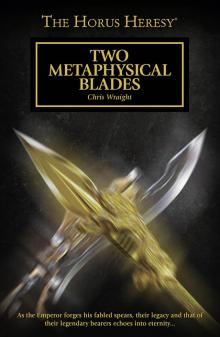 Two Metaphysical Blades
Two Metaphysical Blades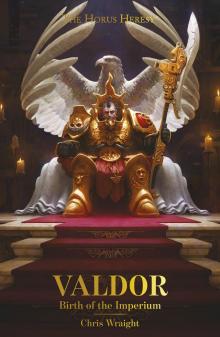 Valdor: Birth of the Imperium
Valdor: Birth of the Imperium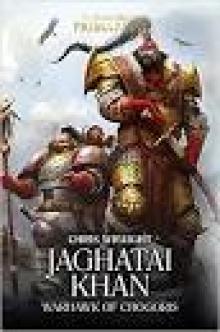 JAGHATAI KHAN WARHAWK OF CHOGORIS
JAGHATAI KHAN WARHAWK OF CHOGORIS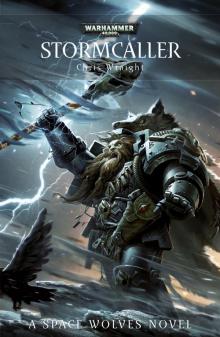 Stormcaller
Stormcaller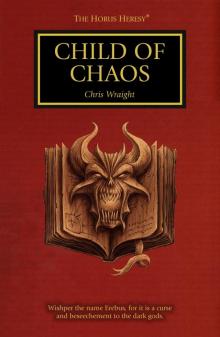 Child of Chaos
Child of Chaos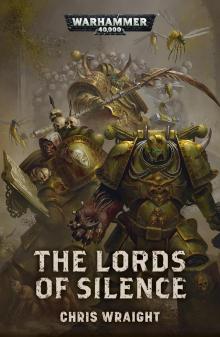 The Lords of Silence
The Lords of Silence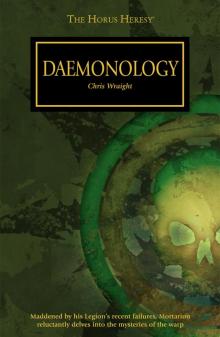 Daemonology
Daemonology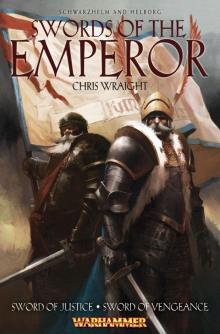 Swords of the Emperor
Swords of the Emperor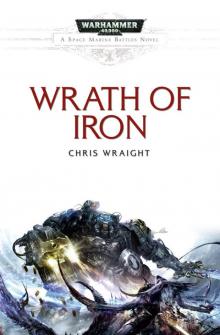 Wrath of Iron
Wrath of Iron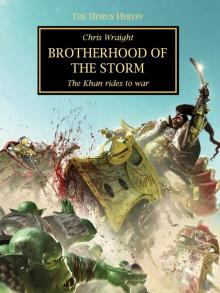 Brothers of the Storm
Brothers of the Storm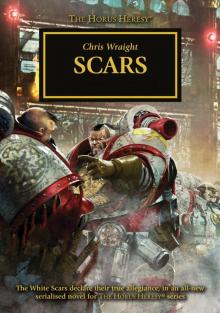 Horus Heresy: Scars
Horus Heresy: Scars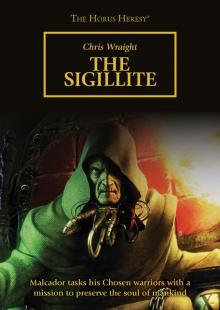 The Sigillite
The Sigillite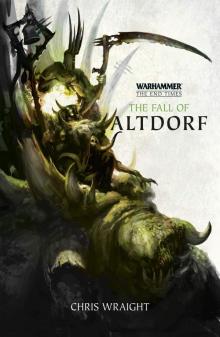 The End Times | The Fall of Altdorf
The End Times | The Fall of Altdorf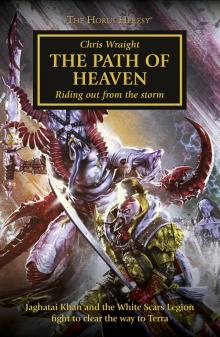 The Path of Heaven
The Path of Heaven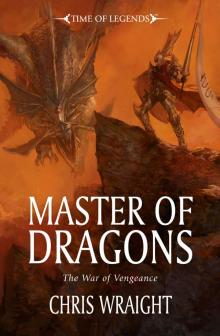 Master of Dragons
Master of Dragons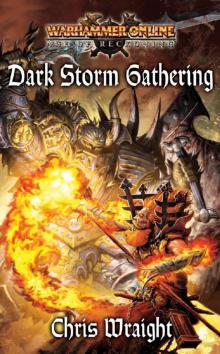 WH-Warhammer Online-Age of Reckoning 02(R)-Dark Storm Gathering
WH-Warhammer Online-Age of Reckoning 02(R)-Dark Storm Gathering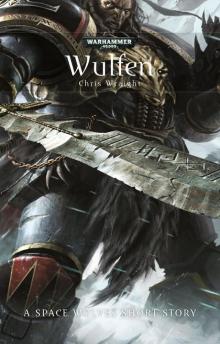 Wulfen
Wulfen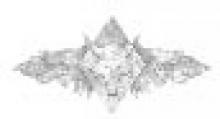 Battle Of The Fang
Battle Of The Fang Onyx
Onyx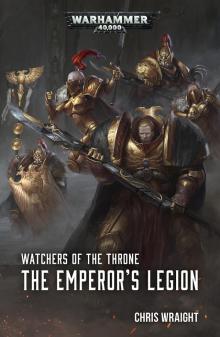 Watchers of the Throne: The Emperor’s Legion
Watchers of the Throne: The Emperor’s Legion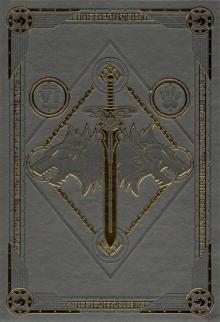 Leman Russ: The Great Wolf
Leman Russ: The Great Wolf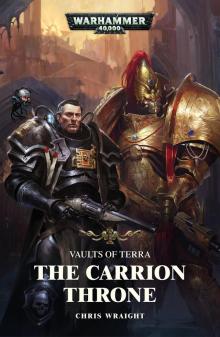 Vaults of Terra: The Carrion Throne
Vaults of Terra: The Carrion Throne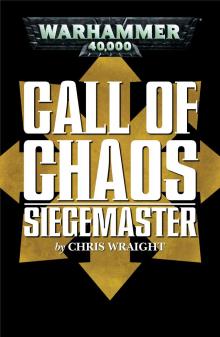 Siegemaster
Siegemaster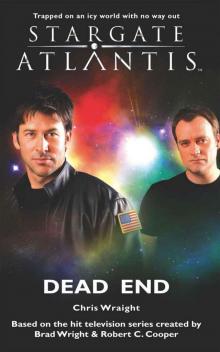 STARGATE ATLANTIS: Dead End
STARGATE ATLANTIS: Dead End Scars
Scars The Empire Omnibus
The Empire Omnibus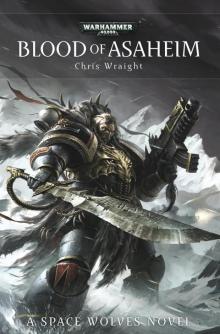 Blood of Asaheim
Blood of Asaheim